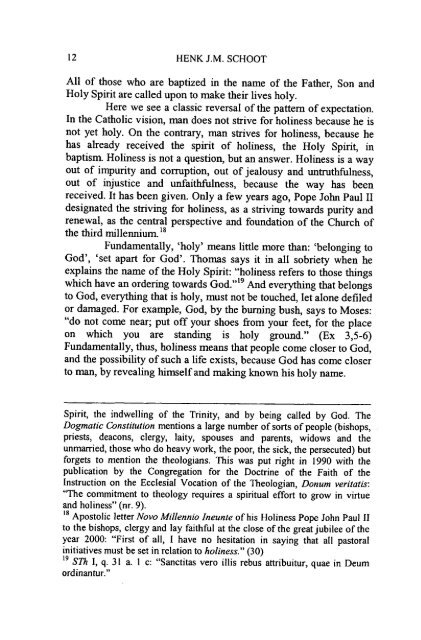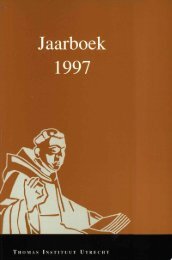Jaarboek Thomas Instituut 2006 - Thomas Instituut te Utrecht
Jaarboek Thomas Instituut 2006 - Thomas Instituut te Utrecht
Jaarboek Thomas Instituut 2006 - Thomas Instituut te Utrecht
Create successful ePaper yourself
Turn your PDF publications into a flip-book with our unique Google optimized e-Paper software.
12 HENK J.M. SCHOOT<br />
All of those who are baptized in the name of the Father, Son and<br />
Holy Spirit are called upon to make their lives holy.<br />
Here we see a classic reversal of the pat<strong>te</strong>rn of expectation.<br />
In the Catholic vision, man does not strive for holiness because he is<br />
not yet holy. On the contrary, man strives for holiness, because he<br />
has already received the spirit of holiness, the Holy Spirit, in<br />
baptism. Holiness is not a question, but an answer. Holiness is a way<br />
out of impurity and corruption, out of jealousy and untruthfulness,<br />
out of injustice and unfaithfulness, because the way has been<br />
received. It has been given. Only a few years ago, Pope John Paul II<br />
designa<strong>te</strong>d the striving for holiness, as a striving towards purity and<br />
renewal, as the central perspective and foundation of the Church of<br />
the third millennium. 18<br />
Fundamentally, 'holy' means little more than: 'belonging to<br />
God', 'set apart for God'. <strong>Thomas</strong> says it in all sobriety when he<br />
explains the name of the Holy Spirit: "holiness refers to those things<br />
which have an ordering towards God."19And everything that belongs<br />
to God, everything that is holy, must not be touched, let alone defiled<br />
or damaged. For example, God, by the burning bush, says to Moses:<br />
"do not come near; put off your shoes from your feet, for the place<br />
on which you are standing is holy ground." (Ex 3,5-6)<br />
Fundamentally, thus, holiness means that people come closer to God,<br />
and the possibility of such a life exists, because God has come closer<br />
to man, by revealing himself and making known his holy name.<br />
Spirit, the indwelling of the Trinity, and by being called by God. The<br />
Dogmatic Constitution mentions a large number of sorts of people (bishops,<br />
priests, deacons, clergy, laity, spouses and parents, widows and the<br />
unmarried, those who do heavy work, the poor, the sick, the persecu<strong>te</strong>d) but<br />
forgets to mention the theologians. This was put right in 1990 with the<br />
publication by the Congregation for the Doctrine of the Faith of the<br />
Instruction on the Ecclesial Vocation of the Theologian, Donum veritatis:<br />
"The commitment to theology requires a spiritual effort to grow in virtue<br />
and holiness" (nr. 9).<br />
18 Apostolic let<strong>te</strong>r Novo Millennia Ineun<strong>te</strong> of his Holiness Pope John Paul II<br />
to the bishops, clergy and lay faithful at the close of the great jubilee of the<br />
year 2000: "First of all, I have no hesitation in saying that all pastoral<br />
initiatives must be set in relation to holiness." (30)<br />
19 STh I, q. 31 a. 1 c: "Sanctitas vero illis rebus attribuitur, quae in Deum<br />
ordinantur."








